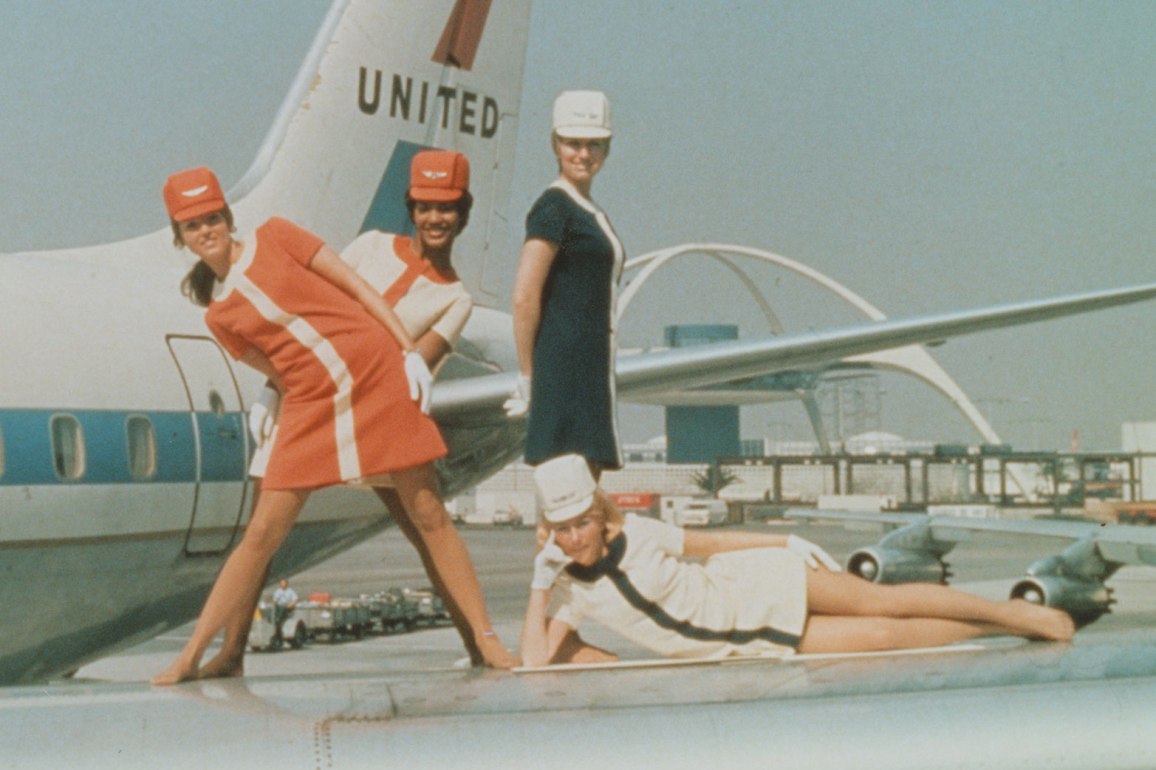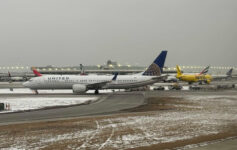United Airlines is currently limiting employee standby travel. Employees were told this was done to encourage social distancing onboard. The reality? Yes, but the limits are not about customer safety, only about customer comfort.
A recent town hall meeting for United employees featured a Q&A session with CEO Scott Kirby, President Brett Hart, and EVP Kate Gebo. The topic of employee standby limits was addressed.
Asking about the standby restrictions, a flight attendant asked:
“I want to know how we justify restricting non-revenue travel in the name of safety while allowing those same middle seats to be sold, upgraded, and used for positive space travel? Either the middle seat is safe or it’s not.”
It’s a very good question. So good, in fact, that Kirby punted to Gebo, the Executive Vice President of Human Resources and Labor Relations. Kirby began by explaining his position that safety onboard airplanes is not about social distancing:
“Safety on board airplanes is not about distancing. What makes things safe on an airplane is wearing a mask and not having the germs and the virus projected out. We filter the air through HEPA grade air filters, which is what hospitals use, every two to three minutes. That as well as our intense cleaning procedures is what makes an airplane safe, which is why we haven’t put a policy in place to block middle seats across the board. So then why did we temporarily block those seats for non-rev? Kate will expand on that.”
Nothing like passing the buck, though Gebo was ready with an answer. Note, though, that his very first sentence is at least facially contradictory to the reason given to employees for limiting standby travel.
Why Limit Employee Standby? Because United Customers Do Not Like To Feel Crowded
Gebo said:
“One of the great benefits of working for the airline is being able to non-rev and being able to get on. Since May 19, when the policy was put in place, over 85% of the non-revs have been able to get on. That is actually a significant improvement from this time last year when it was only 53%. So the vast majority of our non-revs are getting on. Only two percent of our flights actually are restricted by the 70% threshold that we have.
And you may ask, why put a policy in place for only 2% of the flights? Because that two percent, when that happened, is a meaningful impact to our customers. At a time when we’re trying hard to bring them back to flying with us, that’s a trade-off we’re making right now. But this policy is in place only through June 30, as of right now. I think as the traveling public gets more confident with some of the precautions that are in place, it will absolutely be a policy that will be under review.”
Ok, it’s clear. It’s not about safety at all. Instead, customers just like the extra space right now. United sees leaving as many open seats as possible as key to winning as many customers back as possible.
That’s logical, of course, but isn’t that always the case? Who wants a premium cabin full of non-revs or standbys taking up the precious few seats remaining on full flights? This has nothing to do with safety or COVID-19. The problem, of course, is that non-revenue, space available travel is a selling point of the job. For many, flight benefits are not just a fringe benefit, but the fringe benefit that makes working in the volatile airline industry worthwhile.
CONCLUSION
I chuckle at Gebo’s last sentence. Such politician talk…But with flights much fuller than even a week ago, I would not be surprised to see increasingly fewer standby opportunities for employees. When that occurs, expect more grievances from employees and the unions representing them.
If you are considering signing up for a new credit card please click here and help support LiveAndLetsFly.com.





Matt,
Appreciate you writing about this but just an FYI … unfortunately flying benefits are not contractual if I’m not mistaken in any employee groups (except C-suite employees) it’s a company benefit and can be taken away or restricted such as this example by management.
I know pilots and FA attendants have mandatory rest seats on long haul flights but those seats are blocked off and can’t be given away; Otherwise standby travel and seats are delegated by Customer Service at departure time by company seniority, even though we have seen a huge uptick of positive space travel by management to some interesting places such as Hawaii and Florida dead smack in the middle of winter !!
We hope that this isn’t a retaliation for not wanting to take paycuts or reduced hours or for not taking separation packages . Yes, it’s sad but United management is capable of anything at this point.
Thanks
ORD Gate Agent
Thanks. I need to sit down and actually read those behemoth contracts from start to finish!
This is not correct. Some unions on property do have non-rev benefits in their contract.
Can you name them please !
Thanks
I’m confused by your sentence “Who wants a premium cabin full of non-revs or standbys taking up the precious few seats remaining on full flights?”
If you purchase a ticket, you are entitled to a seat. Are you saying that you as a passenger have a right to more than that seat versus the rights of airline employees to occupy otherwise empty space?
Everyone likes open seats around them. Who doesn’t? No one talking is talking about an entitlement.
Don’t forget that many fa’s and pilots commute to their bases for work. If flying standby becomes more difficult, maybe united is hoping to get people to quit. This will help lighten the payroll for sure.
Non-revenue seats are going to become very rare. As airlines come back you will see way less flights which means more passengers will be taking whatever seats are available. I am based in MSP and some destinations from here had flights every hour. Kiss goodbye to that flexibility. There will be very limited number of flights available since no airline want to fly an empty plane. Thus, seats available for non-rev will be very rare for a while.
Hey Matt I think Kate could have given a better answer but I think the real reason is or at least should be that customers are being notified when their flight is 70% or more full, they are then given the chance to change flights . If a customer is not notified it would be a disservice to at the last minute fill the flight when we told them that if the flight was more than 70% full they would be notified.
Agreed. It just isn’t compatible with that goal. Hopefully it is just temporary.
50 yr flight attendant here. Thankfully I chose to never commute. Many flight attendants and pilots will be forced to leave their airline career or relocate. I do not envy them their situation. I have not traveled for non-work reasons (aka pass travel), in over a year. I have always viewed pass travel as a perk in lieu of additional income. I would have always preferred to purchase tickets and receive additional income but I knew this was the terms when I accepted the job. To date I have not ever regretted my decision. I remain grateful for my job and I appreciate my company.
Hopefully lessons will be learned from this pandemic. In approximately 100 years I fear it will be repeated. 98.5 years since the last pandemic.
I’m sympathetic to crews commuting to & fro, but my face always falls when — just as the door closes, the empty coach seat next to me is suddenly stuffed with a last-minute non-rev.
Ha, this is totally unsustainable. Why even bother spending so much time on a policy that will create vast confusion and piss off your employees? It’s so dumb it’s amazing. The airfares on the Big 3 people are flying on right now might have been purchased a month ago were so low that we’re talking Spirit and Allegient level fares. So the majority of your current passengers are just the hoi-polloi. Why even bother worrying about whether these people care if someone is sitting next to them? The first class cabins and upgrade lists are pretty empty these days indicating the elite level everyweek flyers just aren’t back in the planes yet. The airlines surely know this. What do they have to gain by pandering with a totally unsustainable policy?
UA is not afraid of filling those seats if the employees are willing to spend their hard earned money to PURCHASE one. And employees are not given a seat till the last minute. Thus the seats beside the revenue traveller has the seat beside them “stuffed”.
I don’t commute by air to fly because I want to. I commute because I HAVE TO! Airlines move flying jobs from city to city to best suit their business plans. Not the plans of the employees. Possible alternatives are to a) quit and be out of work, b) commute to work and possibly have to buy hotel rooms to work away from home, c) work out of home for much less money as they transfer the flying (bigger aircraft pay more money, Captain pays more than First Officer, line awarded pilots usually at their choosing can make more than a reserve position) to other bases. Oh yes, there is alternative d: sell the house and move everytime the company’s whims change and uproot my family, kids, and dog. That is unacceptable to my wallet and my common sense.
Non rev lives matter!
Of course if passengers don’t want to wait for another flight, they could always choose Delta. Delta always keeps the middle seats open.